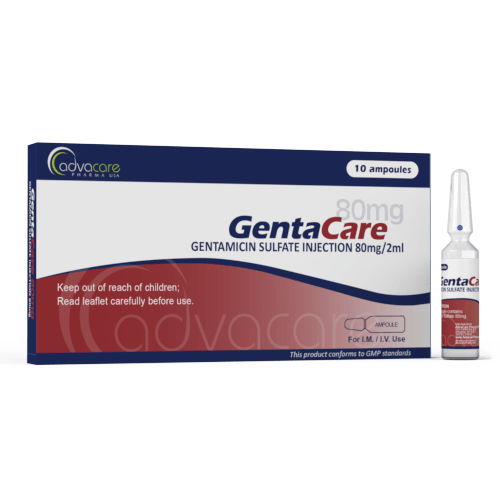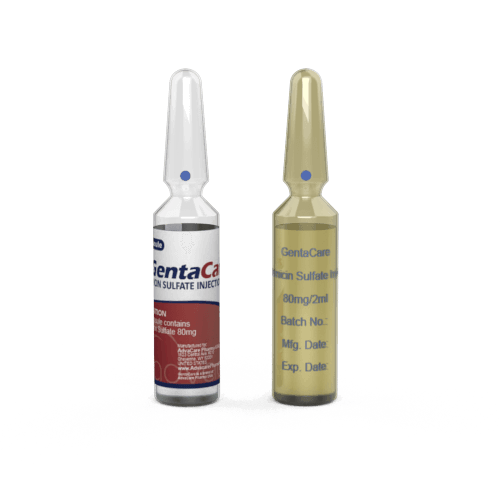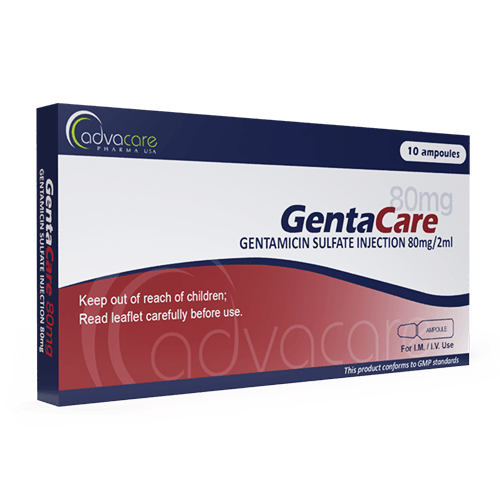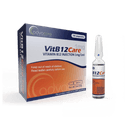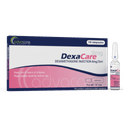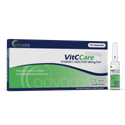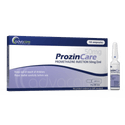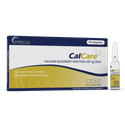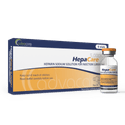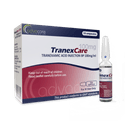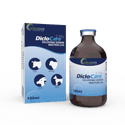- Home›
- Pharmaceuticals›
- Injections›
- Small Volume Injections›
- Gentamicin Injection
Gentamicin Injection
Dosage
Packaging
What is Gentamicin?
Active Ingredients: Gentamicin Sulfate
Gentamicin Sulfate Injection is a drug used to treat severe bacterial infections, such as endocarditis, pneumonia, and urinary tract infections. Gentamicin Sulfate is also prescribed as prophylaxis for surgery.
Gentamicin Sulfate is classified as an aminoglycoside antibiotic. It works by inhibiting protein synthesis within the bacteria by binding to the prokaryotic ribosome. It is bactericidal against both Gram-negative and Gram-positive bacteria.
This antibiotic reaches peak serum concentrations between 30 to 60 minutes and the serum levels are measurable for 6 to 8 hours. It accumulates in the serum and tissues when the patients are treated with higher doses for a prolonged period. Higher concentrations also remain in the presence of impaired renal function. In these cases, the excretion of the drug is also slower.
This product can also be found as eye drops and cream.
AdvaCare Pharma is a trusted exporter of Gentamicin Sulfate Injections. Our supply chain is thoroughly vetted to ensure it meets health, safety, and environmental standards. This medication is produced in our GMP-certified manufacturing facilities in China, India, and the USA.
Why are we a leading Gentamicin manufacturer?
AdvaCare Pharma is a leading manufacturer of Gentamicin Injection. To ensure the quality of our manufactured pharmaceutical injection products, we adhere to stringent GMP guidelines at our manufacturing facilities. We partner with pharmaceutical distributors, hospitals, pharmacies, NGOs, and government institutions across over 65 markets worldwide, and our track record over the past two decades demonstrates that AdvaCare Pharma is a reliable Gentamicin manufacturer and supplier dedicated to high-quality and efficacious medicines.
Uses
What is Gentamicin used for?
It is used to treat severe bacterial infections such as:
- uncomplicated gonococcal infections
- urinary tract infection
- endocarditis
- bacteremia
- pneumonia (hospital-acquired or ventilator-associated)
- severe neonatal infections
Gentamicin Sulfate is used as prophylaxis for surgery and as a combination therapy for the treatment of brucellosis.
How are Gentamicin Injections used?
This medication is manufactured as a solution intended to be given by injection into a muscle or by slow infusion into a vein. The patient’s body weight should be known before administration. In obese patients, the dosage of this antibiotic should be based on an estimate of the lean body mass. This drug should be given for a short term. It should be administered by a healthcare professional in a hospital or clinic setting.
What dose should be given?
Adult Dosing Dosage may vary based on different medical indications:
- For bacterial infections, the usual dose for adults is 1-1.7mg/kg IM/IV, given every 8 hours.
- For serious infections in patients with normal renal function, the recommended dosage is 3mg/kg/day. This should be administered in three equal doses given every 8 hours.
- For life-threatening conditions, the recommended dosage is up to 5mg/kg/day. It should be administered in 3-4 equal doses, but the dosage should be reduced to 3mg/kg/day as the condition improves.
- For obese adults, the dosage should be based on an estimate of the lean body mass.
Pediatric Dosing Recommended dosage for children may vary based on different medical conditions:
- For bacterial infection in children, the recommended dosage is 6 to 7.5mg/kg/day (2 to 2.5mg/kg administered every 8 hours).
- For bacterial infection in infants and neonates, the recommended dosage is 7.5mg/kg/day (2.5mg/kg administered every 8 hours).
- For bacterial infection in premature or full-term neonates with one week of age or less, the recommended dosage is 5 mg/kg/day (2.5 mg/kg administered every 12 hours).
Renal Dosing For adults with renal failure who undergo hemodialysis, the recommended dose at the end of each dialysis period is 1 to 1.7mg/kg depending upon the severity of the infection.
For children with renal failure, the recommended dose is 2mg/kg/day.
In patients with impaired renal function, the serum concentration of gentamicin needs to be monitored. The time gap between doses (in hours) can be estimated by multiplying the serum creatinine level (in mg/100 mL) by 8. For a patient weighing 60 kg with a serum creatinine level of 2.0mg/100 mL, a dosage of 60mg (equivalent to 1 mg/kg) could be administered every 16 hours (calculated as 2 x 8).
Geriatric Dosing The recommended dosage for elderly people depends on their current health status. Most of these patients can receive doses for adults if they do not have impaired liver, kidney, or heart function.
Hepatic Dosing There are no defined guidelines for patients with hepatic impairment.
Refer to a doctor or pharmacist for guidelines on dosage. Do not exceed what they advise.
Who can use Gentamicin?
This antibiotic can be given in patients with serious bacterial infections like Pseudomonas aeruginosa, Proteus species (indole-positive and indole-negative), Escherichia coli, Klebsiella-Enterobacter-Serratia species, Citrobacter species, and Staphylococcus species (coagulase-positive and coagulase-negative). Special considerations need to be taken for some groups of patients.
Pregnant Fetal harm can occur when the medication is used during pregnancy because it crosses the placenta and might lead to a total irreversible bilateral congenital deafness in infants. This happens when the medication is given in high doses or in cases of prolonged use. This injection can either cause fetal harm or can affect the reproduction capacity. Pregnant women should inform their doctors before they undergo a gentamicin treatment.
Pediatric This antibiotic should be given to children only when clearly needed. There is not much scientific data that evaluates the safety of this drug for pediatric patients.
Nursing Gentamicin might cause minimal risk to infants when used during breastfeeding. Nursing women should consult a healthcare professional before taking this medication.
Geriatric The medication should be given with caution in elderly people, especially to those with kidney problems. Elderly people with impaired renal function should be carefully monitored if they are given this injection.
Other warnings
Gentamicin might lead to ototoxicity in patients with certain variants in the mitochondrially encoded 12S rRNA gene (MT-RNR1), particularly the m.1555A>G variant. It can occur even in cases when patients receive normal doses of the drug. This variant is present in a very small population, and in these cases, doctors should decide about other antibiotics.
Nephrotoxicity can occur in cases of concomitant administration of aminoglycosides and cephalosporins.
Limit the usage of this antibiotic and inform your doctor if you have a sudden decrease in hearing, dizziness, and ear ringing.
Patients should be well hydrated during gentamicin treatment.
This antibiotic should be administered cautiously to patients with impaired renal function. If treatment with this drug is clearly needed, the patients need to be carefully monitored.
Side Effects
As with all pharmaceuticals, some unwanted effects can occur from the use of Gentamicin Sulfate Injection.
Common side effects include, but may not be limited to:
- nausea
- upset stomach
- swelling at the site of injection
Serious side effects may include: • signs of an allergic reaction
Some of the most common side effects of aminoglycosides are the nephrotoxic effect and ototoxicity.
Increased blood urea nitrogen (BUN), non-protein nitrogen (NPN) levels, and oliguria are the most common side effects in cases of nephrotoxicity. This usually happens in patients treated for a longer period with large doses.
Patients might also experience pain at the injection site and local irritation.
Neurotoxicity might happen in patients with impaired renal function and the main symptoms are dizziness, tinnitus, and hearing loss. This might happen in cases of excessive dosage, dehydration, and previous exposure to other ototoxic medicaments.
For a comprehensive understanding of all potential side effects, consult a medical professional.
If any symptoms persist or worsen, or you notice any other symptoms, please call your doctor.
Precautions
Do NOT use Gentamicin Sulfate Injection if:
- You are allergic to gentamicin or any other ingredient.
- You are allergic to other antibiotics.
- You have liver, kidney problems, or heart problems
- You are pregnant.
Patients should inform their doctors if they are pregnant, planning to get pregnant, or breastfeeding before taking this drug.
Before treatment, consult your doctor regarding any medications you are taking to address potential drug interactions.
This medication may not be suitable for people with certain conditions, so it is important to consult with a doctor if you have any health conditions.
Gentamicin should not be used concomitantly with some drugs and supplements. Patients should inform their healthcare professionals about any drugs they are taking at the moment.
This injection should be given only by a nurse or other trained medical professional and it is given into the muscle or the vein.
Patients should not consume alcohol during the treatment because it might lead to some side effects and decreased efficacy.
This product should be kept out of reach of children and pets.
Gentamicin 80mg: Why the most common dose?
Gentamicin 80mg is prescribed for its ideal antibacterial properties, treating serious bacterial infections, including those of the blood, lungs, and abdomen. This dosage provides a strong therapeutic effect, promising rapid bacterial eradication while maintaining a manageable side effect profile.
References
Efficacy and safety of a single daily dose of gentamicin in hospitalized Indian children: a quasi-randomized trial
The objective of this study was to compare the clinical efficacy, pharmacokinetic profiles, and safety of once-daily dosing (ODD) and multiple daily dosing (MDD) of gentamicin in hospitalized Indian children.
This study included 400 hospitalized children who were randomly assigned alternately to receive either once-daily dosing (ODD) or multiple-daily dosing (MDD) regimens. The study aimed to assess two primary outcomes: achieving a favorable clinical outcome based on predefined criteria and monitoring the occurrence of any side effects.
The results revealed that a once-daily dosing (ODD) of gentamicin was found to be effective and safe. A favorable clinical response was observed in 89% (167 out of 188) of patients in the ODD group compared to 76% (161 out of 212) in the multiple-daily dosing (MDD) group. A higher percentage of patients in the ODD group achieved favorable gentamicin peak concentrations (100%) compared to the MDD group (87%). The MDD group had a higher incidence of undesirable trough concentrations (17%) compared to the ODD group (0%).
The conclusion of this study is that extended-interval (once daily) dosing is safe and efficacious.

You might be interested in...
Why AdvaCare Pharma?
As an industry leader, we are aware of our responsibility to provide affordable and sustainable solutions to improve healthcare worldwide.
